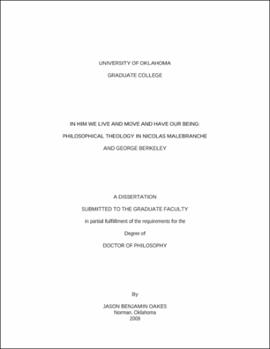| dc.contributor.advisor | Cook, Monte | |
| dc.creator | Oakes, Jason Benjamin | |
| dc.date.accessioned | 2019-04-27T21:21:42Z | |
| dc.date.available | 2019-04-27T21:21:42Z | |
| dc.date.issued | 2010 | |
| dc.identifier | 99123991102042 | |
| dc.identifier.uri | https://hdl.handle.net/11244/318492 | |
| dc.description.abstract | My chief argument is that Malebranche and Berkeley hold similar theories of philosophical theology and that in each case understanding their philosophical theology helps us to understand their philosophical system. Both accept the traditional doctrines of divine revelation and the Trinity from Christian theology. Not only do they accept these doctrines, but the doctrines are philosophically relevant to the philosophical systems of both philosophers. In other words, some of the philosophical similarities between the two philosophers can be explained in light of their similar theories of philosophical theology. Malebranche and Berkeley's shared acceptance of this doctrine helps explain their epistemological similarities. Malebranche and Berkeley also hold similar doctrines of the Trinity. Understanding these similar theories sheds light on their similar metaphysical positions. | |
| dc.format.extent | 235 pages | |
| dc.format.medium | application.pdf | |
| dc.language | en_US | |
| dc.relation.requires | Adobe Acrobat Reader | |
| dc.subject | Philosophical theology--History | |
| dc.title | IN HIM WE LIVE AND MOVE AND HAVE OUR BEING: PHILOSOPHICAL THEOLOGY IN NICOLAS MALEBRANCHE AND GEORGE BERKELEY | |
| dc.type | text | |
| dc.type | document | |
| dc.thesis.degree | Ph.D. | |
| ou.group | College of Arts and Sciences::Department of Philosophy | |
